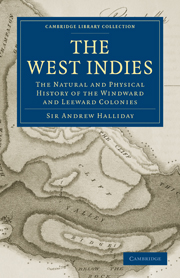Book contents
- Frontmatter
- Contents
- CHAPTER I
- CHAPTER II
- CHAPTER III
- CHAPTER IV
- CHAPTER V
- CHAPTER VI
- CHAPTER VI
- CHAPTER VII
- CHAPTER VIII
- CHAPTER IX
- CHAPTER X
- CHAPTER XI
- CHAPTER XII
- CHAPTER XIII
- CHAPTER XV
- CHAPTER XVI
- CHAPTER XVII
- CHAPTER XVIII
- CHAPTER XIX
- CHAPTER XX
- CHAPTER XXI
- CHAPTER XXII
- APPENDIX I
- APPENDIX II
- Plate section
- Frontmatter
- Contents
- CHAPTER I
- CHAPTER II
- CHAPTER III
- CHAPTER IV
- CHAPTER V
- CHAPTER VI
- CHAPTER VI
- CHAPTER VII
- CHAPTER VIII
- CHAPTER IX
- CHAPTER X
- CHAPTER XI
- CHAPTER XII
- CHAPTER XIII
- CHAPTER XV
- CHAPTER XVI
- CHAPTER XVII
- CHAPTER XVIII
- CHAPTER XIX
- CHAPTER XX
- CHAPTER XXI
- CHAPTER XXII
- APPENDIX I
- APPENDIX II
- Plate section
Summary
On Monday, the 17th of March, 1834, I left the island of Barbados, and on Friday, the 21st of the same month, landed at Georgetown, in the colony of British Guiana. When the trade-winds blow from the north of east the passage has been made in sixty hours, or in less time, but in general it occupies three or four days.
The colony or province now called “British Guiana,” comprehends the whole of that territory on the coast of the South American continent which was originally colonized by the Dutch; and what is rather singular, the Dutch now possess the only small portion of the same continent that was first colonized by the English, viz. Surinam.
Under its new and now recognised appellation of “British Guiana,” are comprehended the three distinct Dutch settlements or colonies, upon the banks of the rivers Berbice, Demerary, and Essequibo; a tract of country extending from the equator to nearly ten degrees north, and stretching along the Atlantic Ocean for 200 and 300 miles; from the banks of the Great Oronoko on the west, to the borders of the before-mentioned river or colony of Surinam on the east.
The eastern boundary is the most southerly; and at the extreme west, the soil deposited from the waters of the Oronoko causes the land to trend considerably to the north. Georgetown, the capital city of the province, stands on the banks of the river Demerary, near its mouth, and is as nearly as possible in the centre, between the two extreme points.
- Type
- Chapter
- Information
- The West IndiesThe Natural and Physical History of the Windward and Leeward Colonies, pp. 95 - 99Publisher: Cambridge University PressPrint publication year: 2010First published in: 1837



